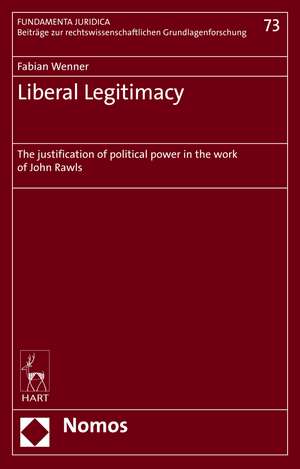Liberal Legitimacy: The Justification of Political Power in the Work of John Rawls
Autor Dr Fabian Wenneren Limba Engleză Hardback – 2 sep 2020
Preț: 654.45 lei
Preț vechi: 941.93 lei
-31% Nou
Puncte Express: 982
Preț estimativ în valută:
125.27€ • 136.12$ • 105.29£
125.27€ • 136.12$ • 105.29£
Carte disponibilă
Livrare economică 31 martie-14 aprilie
Preluare comenzi: 021 569.72.76
Specificații
ISBN-13: 9781509946006
ISBN-10: 1509946004
Pagini: 304
Dimensiuni: 156 x 234 x 18 mm
Greutate: 0.39 kg
Editura: Bloomsbury Publishing
Colecția Nomos/Hart
Locul publicării:London, United Kingdom
ISBN-10: 1509946004
Pagini: 304
Dimensiuni: 156 x 234 x 18 mm
Greutate: 0.39 kg
Editura: Bloomsbury Publishing
Colecția Nomos/Hart
Locul publicării:London, United Kingdom
Caracteristici
Allows for new perspective on how A Theory of Justice and Political Liberalism converge and diverge
Notă biografică
Fabian Wenner is Researcher at the Center for the Advanced Study in Bioethics at the University of Münster and Research Assistant at the University of Münster.
Cuprins
Introduction Thinking about legitimacy The liberal perspective on legitimacy The challenge of pluralism and public justification Legitimacy as public justification in Rawls's work The structure of the book Part I - Liberal legitimacy in context 1. The concept of legitimacy 1.1 The elements of political power 1.2 Concepts and conceptions of legitimacy 1.3 Empirical conceptions of legitimacy 1.4 Normative (especially liberal) conceptions of legitimacy 1.5 Conclusion of the chapter2. Liberal legitimacy and public justification 2.1 Two ideas of consent 2.2 Voluntarist accounts and their shortcomings 2.3 Hypothetical agreement and contractualism 2.4 Legitimacy as public justification 2.5 Conclusion of the chapter Part II: Liberal legitimacy in a Rawlsian framework 3. Justice and legitimacy before the political turn 3.1 The nature of justification and reflective equilibrium 3.2 The contractualist argument for justice as fairness 3.3 Democratic politics and legitimacy in Theory 3.4 The stability of a well-ordered society as a justificatory condition3.5 Conclusion of the chapter 4. The challenge of reasonable disagreement 4.1 Reasonable disagreement and the burdens of judgment 4.2 Reasonable disagreement and the fundamentals of Theory 4.3 The problems with reasonable disagreement and pluralism 4.4 Conclusion of the chapter 5. Liberal legitimacy in Political Liberalism 5.1 The political conception of justice 5.2 (Un)Reasonable citizens and the limits of public justification 5.3 The role of overlapping consensus 5.4 Public reason and the legitimate exercise of political power 5.5 Conclusion of the chapter 6. Beyond legitimacy as public justification 6.1 The duties of citizens who reject political liberalism 6.2 The normative authority of partially illegitimate legislation 6.3 The political and philosophical status of political liberalism 6.4 Conclusion of the chapter
